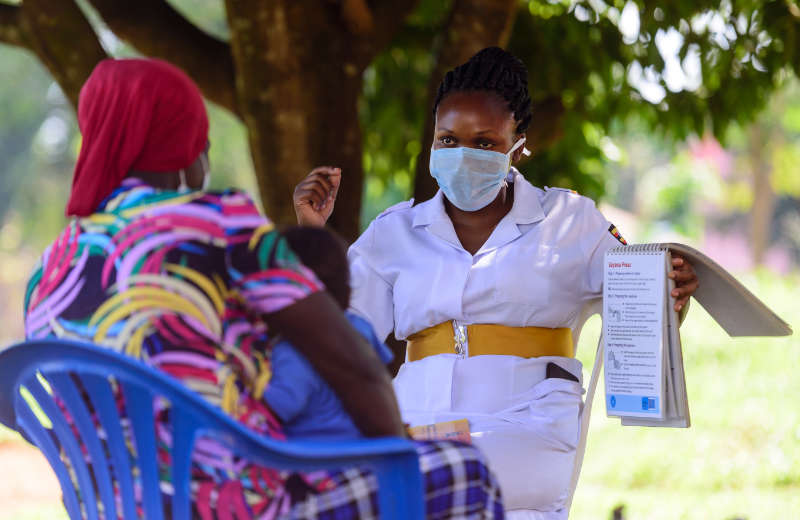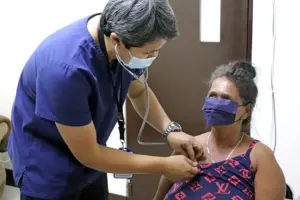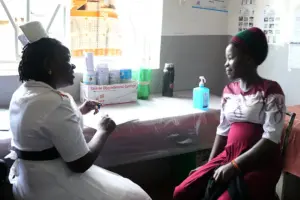A TB focal person leads a team of health workers to update their TB registers. Photo credit: Nicholas Kirirabwa
Uganda
Uganda has made significant progress to address the health challenges impacting its population. Twenty years ago, life expectancy at birth shrank to 45 years because of the HIV/AIDS epidemic. Today, life expectancy in Uganda is 63 years, an achievement made possible by the U.S. President’s Emergency Plan for AIDS Relief (PEPFAR) program’s success in HIV testing and treatment and improvements in child health through interventions aimed at preventing malaria and improving nutritional status.

Despite this progress, much of Uganda’s population continues to suffer from poor health due to infectious diseases, high rates of maternal and newborn mortality, inadequate access to reproductive health services, and a growing burden of non- communicable diseases. The COVID-19 pandemic has taxed the already overburdened health system.
Since the early 1990s, URC has supported the government of Uganda to strengthen its health system and integrate quality improvement (QI) approaches to increase the demand for, access to, and quality of integrated health services.
URC recently completed implementation of two of the five USAID Regional Health Integration to Enhance Services (RHITES) Activities in Uganda – one in the East Central Region (USAID RHITES-EC), and one in Northern Uganda (USAID RHITES-N, Acholi). Both activities used an integrated health system strengthening approach for primary health care that increased access to and use of quality health services, facilitated adoption of healthy behaviors, and strengthened district health systems.
The five-year USAID Defeat TB Project supported Uganda’s TB Control Program to improve TB case detection and treatment with civil society organizations and key partners. Defeat TB strengthened the systems and processes for using TB data, knowledge, and research to support Uganda’s leadership, policy, and planning for TB control. The activity both developed and scaled up national TB control QI change packages.
Current Projects
For the USAID Uganda Health Activity (UHA), URC leads a group of Ugandan and international partners that are supporting the Ministry of Health and district and regional health teams to transform existing human resources for health at the community, facility, district, and regional levels into proponents, managers, and providers of respectful, people-centered care and bolstering the political stewardship, local ownership, private sector engagement, multi-sectoral collaboration, and community participation to achieve equity, sustainability, and accountability. UHA is introducing governance and health systems strengthening interventions in 72 health districts in seven diverse sub-regions to ensure that local health service delivery networks, through Uganda’s hub and spoke model, improve their performance and management systems to equitably deliver cost-effective, high quality health services in their catchment areas. In 30 of these districts, UHA is providing direct support to improve access to, demand for, and use of quality family health services at the community and facility levels.
The URC-led Department of Defense HIV/AIDS Prevention Program Uganda (DoD Uganda URC Project) supports the Uganda People’s Defense Force (UPDF) HIV/AIDS epidemic control efforts by improving access to and quality of care across 40 military health facilities. The project has supported the accreditation of new ART facilities, increased HIV testing and ART coverage in UPDF facilities, enrolled adolescent girls and young women in care, and increased service reach to orphans and vulnerable children.


